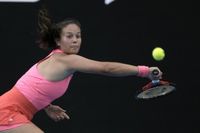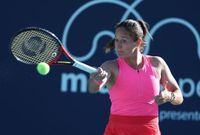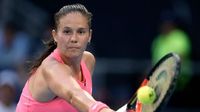Daria Kasatkina, the Russian-born tennis star currently ranked No. 12 in the world, has officially announced her switch to representing Australia after her application for permanent residency was accepted by the Australian government. This significant decision marks a new chapter in her career as she transitions from competing as a neutral athlete, a status she has held since Russian and Belarusian players were banned from competing under their national flags following the invasion of Ukraine in 2022.
In an emotional Instagram post on March 28, 2025, Kasatkina expressed her joy and excitement about her new status. "I am delighted to let you all know that my application for permanent residency has been accepted by the Australian government," she wrote. "Australia is a place I love, is incredibly welcoming and a place where I feel totally at home. I love being in Melbourne and look forward to making my home there. As part of this, I am proud to announce that I will be representing my new homeland, Australia, in my professional tennis career from this point onwards."
Kasatkina's journey to this point has not been without its challenges. The 27-year-old athlete has not returned to Russia for over two years, largely due to her outspoken criticism of the war in Ukraine and her identity as a gay woman. In a 2022 interview, she publicly came out, a move that made headlines in Russia and drew both support and backlash. "I fled Russia because I did not feel safe as a gay person who opposes the war," Kasatkina stated, highlighting the personal stakes involved in her decision to leave her home country.
Born in Tolyatti, Russia, Kasatkina began playing tennis at the age of six, inspired by her brother Alexsandr, who is also her fitness trainer. She quickly rose through the ranks, winning the Roland-Garros girls' singles title in 2014 and reaching a peak junior ranking of No. 3. Her professional career took off shortly thereafter, with her making her WTA main draw debut in 2015.
Kasatkina's accolades include reaching the semifinals of the French Open in 2022 and being a quarterfinalist at Wimbledon in 2018. She has won eight WTA singles titles and has earned over $13 million in prize money throughout her career. Her best ranking was No. 8, and she has consistently been one of the top players on the tour.
As she prepares to don the Australian colors, Kasatkina will undoubtedly become a key figure in Australian tennis, especially following the retirement of former world No. 1 Ash Barty. Tennis Australia has welcomed her with open arms, stating, "Tennis Australia warmly welcomes Daria to the Australian tennis family. Effective immediately, Daria will compete as an Australian, and we wish her all the best for her upcoming tournaments."
Kasatkina's move to Australia is part of a broader trend among athletes seeking to switch allegiances amid geopolitical tensions. She joins the ranks of other players like Daria Saville, Ajla Tomljanovic, and Arina Rodionova, who have made similar eligibility switches in recent years.
Looking ahead, Kasatkina is set to represent Australia at the upcoming Australian Open in January 2026. Her recent performances have shown promise; she reached the fourth round at Melbourne Park for the first time this year, and her experience as a former semifinalist at the French Open will undoubtedly serve her well as she competes for her new country.
As she embarks on this new chapter, Kasatkina remains grateful for the support she has received throughout her journey. "Obviously, there are parts of this decision that have not been easy," she reflected. "I want to express my thanks and gratitude to my family, coaches, and everyone who has supported me throughout my tennis journey to date. I will always have respect and fond appreciation for my roots, but I am thrilled to start this new chapter in my career and my life under the Australian flag."
Kasatkina's story is one of resilience and courage, embodying the struggles faced by many athletes navigating the complexities of national identity, personal safety, and professional aspirations. As she steps onto the court representing Australia, she not only carries her dreams but also the hopes of many who see her as a symbol of strength and determination in a challenging world.








